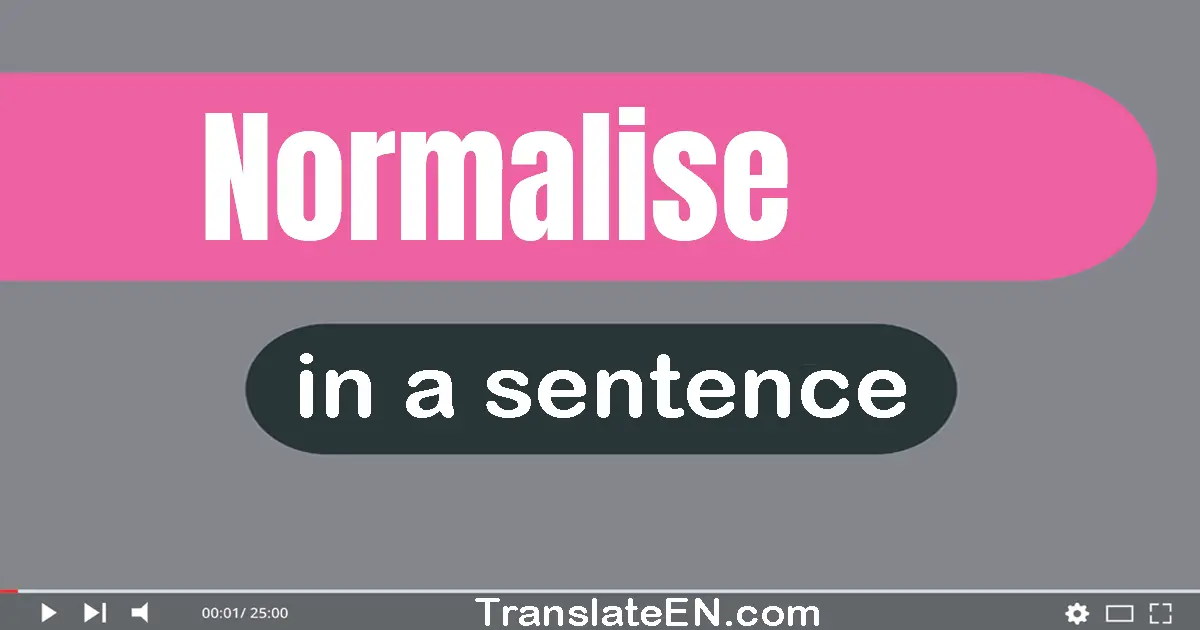Normalise in a sentence
Synonym: standardize. Antonym: distort
Meaning: to make normal; to standardize

Normalise meaning
Normalise is a versatile word that can be used in various contexts to convey the idea of making something normal, standard, or acceptable. Whether you are writing an academic paper, a professional email, or simply engaging in a casual conversation, incorporating the word "normalise" can enhance your communication skills. Here are some tips on how to effectively use this word in different sentences:
1. Academic Writing: In academic writing, it is crucial to use precise language to convey your ideas effectively. When using "normalise" in an academic context, consider the following tips: - Define the term: Before using "normalise," provide a clear definition or explanation of what you mean by normalising.
For example, "To normalise a variable in statistics means to transform it to have a standard distribution." - Provide examples: Illustrate the concept of normalisation by providing examples or case studies. This helps the reader understand how the process works. For instance, "Researchers normalised the data by adjusting for population size, ensuring accurate comparisons between different regions." - Use it in a theoretical framework: If you are discussing a theoretical framework or model, incorporate "normalise" to explain how certain variables are adjusted or standardised.
For example, "In order to compare the performance of different companies, it is necessary to normalise their financial statements by adjusting for inflation."
2. Professional Communication: In professional settings, using "normalise" can demonstrate your ability to articulate ideas clearly and concisely. Here are some tips for incorporating this word into professional communication: - Be specific: Clearly state what you are normalising and why. For instance, "To improve efficiency, we need to normalise the workflow by implementing standardized procedures." - Highlight benefits: Emphasize the advantages of normalising a particular process or situation.
For example, "By normalising our company's work hours, we can ensure a better work-life balance for our employees." - Use it in problem-solving: If you are proposing a solution or addressing an issue, consider using "normalise" to suggest a way to make things more manageable or acceptable. For instance, "To address the high turnover rate, we should normalise employee feedback and create a culture of open communication."
3. Casual Conversations: In everyday conversations, using "normalise" can help express your thoughts clearly and precisely. Here are some tips for incorporating this word into casual conversations: - Simplify the language: Avoid using overly complex or technical explanations when using "normalise" in casual conversations. Instead, opt for simpler language that everyone can understand.
For example, "We should normalise recycling to protect the environment." - Relate it to personal experiences: Connect the concept of normalisation to relatable situations or personal experiences to make your point more engaging. For instance, "Let's normalise expressing our emotions openly, as it can lead to healthier relationships." - Encourage discussion: Use "normalise" to initiate a conversation or debate about societal norms or practices.
For example, "We need to normalise discussing mental health to reduce the stigma associated with it."
In conclusion, incorporating the word "normalise" into your writing or conversations can enhance your communication skills by conveying the idea of making something normal, standard, or acceptable. By following these tips, you can effectively use this word in various contexts, whether it be academic writing, professional communication, or casual conversations.
The word usage examples above have been gathered from various sources to reflect current and historical usage of the word Normalise. They do not represent the opinions of TranslateEN.com.
